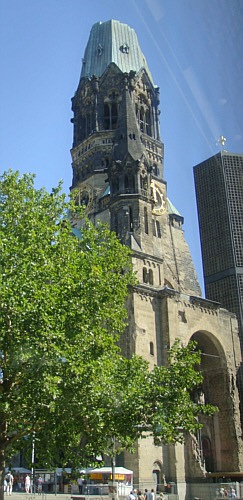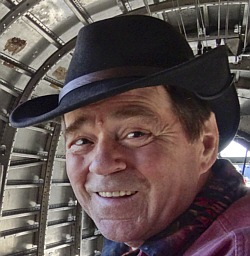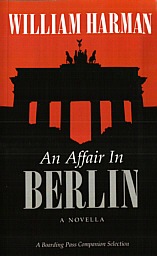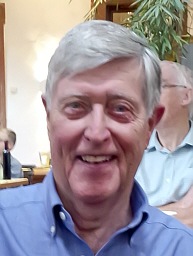In the summer of 1958 three college students travel from Holland to Berlin and begin a seesaw
affair with East and West Berlin. The seeds of unrest were there as the Iron Curtain metaphor created
by Winston Churchill years earlier was soon to take physical form in a concrete wall dividing the east
and west sectors of Berlin. This was an increasingly tense period for travelers, but our heroes braved
the trains and the Brandenburg Gate, visiting friends in East and West Berlin and stretching their limited
money in the cheaper East Berlin fancy restaurants and watering holes.
Tossing his clothes in a bag after a phone call, Tom joins Harry and Mike on a train from The Hague to
Berlin, not much planning except for the idea of just seeing Berlin, both sides of the city. A friend who
lived there, Walter, assured them that a visa could be purchased at the checkpoint, a situation which we
discover later is likely a bribe paid to the young East Berlin police (Vopos) to get a stamp on their
passport.
The eponymous affair begins at the stop in Hanover when the three budding lawyers admire and compare notes about
a woman with a male companion waiting for the same train to Berlin.
[page 22] The woman, nearly as tall as the man, was stunning in low heels and a
white dress with lace trim. He, with his slightly graying hair and Nordic features,
conveyed an air of success and authority; she, with her beautiful youthful face and
figure, imparted softness and breeding. They spoke to each other in quiet tones,
facing the train, without their bodies actually turned toward each other.
With nothing else to do, the three compatriots began to analyze that regal
couple, alone on the platform. Who might they be and what might be their
relationship? They speculated: Father and daughter? Husband and trophy bride?
Lovers about to slip away? Were they about to board the Northwest Express?
Might they enter the Berlin carriage? Was she seeing him off and would be lost
forever? Might she be the one traveling, alone?
"Look at her lips," Mike exclaimed. "Look at her lower lip. Have you ever
seen a more sensuous lower lip in your life?"
"I do like the way it curls down," said Harry.
The three were tired and it began to show. They had become giddy. After
careful observation and analysis, referencing the most beautiful Hollywood
actresses he could remember, Harry announced, "Mike, I have to agree with you.
That stunning woman does have, without any question, the world's most exquisite
lower lip."
"Maybe with the possible exception of Ingrid Bergman," Tom said, "but no
exceptions tonight. The beautiful lady with the flawless lip has my vote, too."
Unexpectedly, the exquisite lady says goodbye to the man and boards the packed train at the last
second and ends jammed up next to and almost breathing on Tom, who had admired her from-a-distance! This gives Tom a chance to try out his meager knowledge of German and determine that she
spoke English as haltingly as he did German. Maria becomes a friend of Tom's and joins in their
seesaw-sightseeing between East and West Berlin.
We get a vivid view of post-WWII Berlin from the author, Jim Harman, who spent a lot of time
there in this semi-autobiographical novella. My wife and I met Jim and Connie in Switzerland a few
years ago at the Palace Hotel in Lucerne after our good friends and travel companions, Gust and Janet,
who had just met the couple some time earlier, introduced them to us. There we were, three guys and
three girls, suddenly the best of friends, touring Lucerne and then Germany and France along the Rhine
River together, pretty much like Tom, Mike, and Harry, but without the war-time destruction all around
us and none of the East-West tensions they encountered.
Maria in her halting English describes the war's immediate aftermath in Berlin, what it was like
as the fighting completely and suddenly ceased.
[page 31] "Then a few days later it all stops. Order comes. Berlin is destroyed.
Berlin looks like the end of world, moldy Swiss cheese. And it is springtime, a time
when flowers bloom and birds sing. Berlin has no flowers, no birds. Blood is
Berlin's flower; death is her song."
Tom asks Maria more questions about Berlin life in the years following the war's end.
[page 33] "You have endured much suffering. I am very sorry about that. When
did life get better for you?"
"In spring of 1948 life improved. Not much, but it was better. Then it
happened."
"What happened?"
"The Russians started in June to blockade West Berlin: Railroads.
Autobahns. Canals. They tried to starve us — more than two million West
Berliners — by keeping out food and coal and everyday living supplies."
"But the Russians did not block the air lanes into Berlin," Tom said.
"Yes, American airplanes brought food and coal and medicines. We
watched them land and take off at Tempelhof. Life was difficult, but not like 1945
and 1946. Those were terrible years. The Americans gave us hope and faith. They
were on our side. That gave Berliners strength and the will to survive. Almost a
year later, May 1949, the blockade ended, just like that. The Russians lost. The
Americans won."
The three guys take a train to a lakeside resort in Wannsee, bringing their bathing trunks with them
and towels, but having no place to change into their trunks, they adopt the German method which
involves holding a towel around them with their left hand and using one's other two right hands to slip
out of civvies and into swimming gear. Oops, that would require one to have two right hands; somehow
the Germans had learned to manage this feat of dexterity with only one right hand.
[page 69, 70] Tom was first to venture into changing. He took off his shirt, wrapped
a towel around his body and slipped off his trousers. He was now in his shorts, so
far so good. Next, he dropped his shorts and gripped the bathing suit while holding
the towel. One leg was in the bathing suit, one leg to go. Suddenly he needed a third
hand. Whoops! Tom staggered off balance; the bathing suit dropped to his ankles.
He found himself falling backward. There was no way to stop the fall. On the
ground now, his body was in a spread eagle position, letting the sun shine in from
head to toe and everything in between, choreographed, it would appear, with
drama and panache. The crowd burst into roaring laughter followed by loud
applause; chalk that up to another of life's unanticipated zingers that everyone is
subjected to. The event defined the German expression of Schadenfreude better
than any dictionary. Tom simply had experienced the term in its native habitat.
When I visited Berlin in 2009, our bus passed a church which sounds exactly like the one the author
describes in this next passage. I got several photos of it, but not the name of the church whose original
bell tower has remained in ruins for over 70 years, and with a new functional bell tower looking like
a modern skyscraper built beside it.

[page 73] From the ruins of the Kaiser-Wilhelm-Gedächtniskirche, the Kudamm,
as the locals called the boulevard, stretched nearly two miles
westward. All that was left of that magnificent church, built in
memory of Wilhelm I, was part of the west bell tower, a darkened,
jagged vertical slice of granite blocks. The Berliners called it
hohler Zahn, the hollow tooth. As a touch of irony that single
ruined tower, remnant of a Kaiser's memorial, had become
another memorial, one for the Second World War. It was the will
of the people, of the Berliners, that the tower would not be
demolished.
When the boys meet Helmut, they find him a voluble companion, full of
information about how and why Hitler, a second-rate painter whose art might
hang in shopping malls today, came to power in Germany after the Great War
to precipitate World War II.
[Page 95] "The causes and the eventual result can be
debated forever," announced Helmut, "but if you lived
during that earlier time, as my parents did, and Maria's and Ilse's, when food was
scarce and our stomachs were always empty and there was endless fighting among
fellow Germans in the streets below, then you might begin to understand how one
thing led to another. You might then understand how Germany ended up with a
despotic leader, bent on domination and subjection not only of his own people, but
others as well."
Which discussion leads Tom to analyze how the Great War itself began after an assassination of
the Archduke. The many countries of Europe were entangled like swimmers having a pact to save one
another if one went under and soon all the swimmers were dragged into the struggle and were soon
drowned in war.
[page 142] "Tragically, that was the way the world of Europe operated." Tom
added. "Those entangling alliances, whether they were treaties or arrangements,
originally created for protection, produced ultimately the unintended consequences
of the Great War."
Helmut always offered information about everything except about himself. No one knew exactly
what his background was, but doubts about whose side he was on crept into everyone's mind. This
added to the drama of constantly moving each day back and forth across the Soviet and American
sectors of Berlin. On the final night heading back to West Berlin, Mike decides on a prank equivalent
to stealing the bell from Taco Bell. This became so popular that, even though few pranksters were
caught, the fast food chain had to remove the real bells and replace them by painted ones. What Mike
chose to do was to take down a Soviet flag, steal it, and wrap himself in it under his coat, right before
they were ready to cross the border. If they missed the last train, they would be subject to search and
possible execution by the Vopos guarding the Brandenburg Gate. Even if they passed the Vopos
inquisitions of why they were crossing so late, they would have to walk across the dead's man's land
of the Brandenburg Gate with machine guns trained on their back. One silly college prank could end
their lives. They had no friends who could save them, except the mysterious Helmut, perhaps,
but they hadn't seen Helmut for several days and he may well be part of the Vopos himself.
Will our heroes make it out of East Berlin alive? Will Tom ever see Maria again? Will the affair
in Berlin be a life-changing one? It was already that as we read near the final pages, but will it end up being changes
for the better? Join these three young students in their affairs and adventures, as they navigate through
two post-war Berlins and discuss how and why things went so wrong in two wars for Germany. You
may get to feel what it was like yourself to have lived through those interesting and trying times.
~^~
Any questions about this review, Contact: Bobby Matherne
~~~~~~~~~~~~~~~~~~~~~~~~~~~~~~~~~~~~~~~~~~~~~~~~~~~~~~~~~~

 == == == == == == == == == == == == == == == ==
== == == == == == == == == == == == == == == ==
22+ Million Good Readers have Liked Us
22,454,155
as of November 7, 2019
Mo-to-Date Daily Ave 5,528
Readers
For Monthly DIGESTWORLD Email Reminder:
Subscribe! You'll Like Us, Too!
== == == == == == == == == == == == == == == ==
Click Left Photo for List of All ARJ2 Reviews Click Right Bookcover for Next Review in List
Did you Enjoy this Webpage?
Subscribe to the Good Mountain Press Digest: Click Here!


CLICK ON FLAGS TO OPEN OUR FIRST-AID KIT.
All the tools you need for a simple Speed Trace IN ONE PLACE. Do you feel like you're swimming against a strong current in your life? Are you fearful? Are you seeing red? Very angry? Anxious? Feel down or upset by everyday occurrences? Plagued by chronic discomforts like migraine headaches? Have seasickness on cruises? Have butterflies when you get up to speak? Learn to use this simple 21st Century memory technique. Remove these unwanted physical body states, and even more, without surgery, drugs, or psychotherapy, and best of all: without charge to you.
Simply CLICK AND OPEN the
FIRST-AID KIT.

Counselor? Visit the Counselor's Corner for Suggestions on Incorporating Doyletics in Your Work.

All material on this webpage Copyright 2019 by Bobby Matherne






